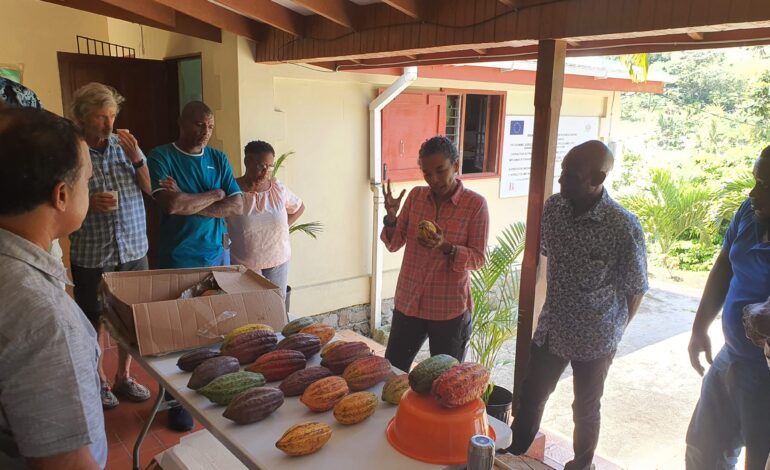
Important strategic partnership aims to increase the production of the island’s world-class cocoa
17 April, 2023 – Castries, Saint Lucia – Saint Lucia’s cocoa beans are among the highest quality, being fine or flavour cocoa, and The Food and Agriculture Organization of the United Nations (FAO) and the Saint Lucia Ministry of Agriculture, Fisheries, Food Security and Rural Development are working diligently together to grow and expand the local cocoa sector.
The Programme for Capacity Building related to Multilateral Environmental Agreements in ACP Countries (ACP MEAs 3), a partnership among the European Union, the Organization of African, Caribbean and Pacific States (OACPS), UN Environment Programme (UNEP) and the Food and Agriculture Organization of the United Nations (FAO), funds the project. The programme aims to build capacity in 79 countries in Africa, Caribbean, and the Pacific (ACP) to support them in fulfilling their obligations as parties to Multilateral Environmental Agreements (MEAs), to address the environmental challenges they face and to reap the benefits of improved environmental governance at national and regional levels.
According to the International Cocoa Organization (ICCO), fine cocoa is free of defects in flavour and provides a complex flavour profile that reflects both the expertise of the producers and the cocoa’s terroir, that is, the environment where the cocoa has been grown, fermented, and dried. Flavour cocoa has little or no defects in flavour and provides valuable aromatic or flavour characteristics that are important in cocoa blends. Fine and flavour cocoa reflect the historical and cultural heritage of the producing country. The ICCO has classified 100% of the cocoa beans exported from Saint Lucia to be fine or flavour cocoa, making the country one out of 23 countries worldwide which exports fine or flavour cocoa, and one out of nine countries with 100% fine or flavour cocoa exports, with its main export destination being the United Kingdom.
In Western Europe and Japan, fine or flavour cocoa is used to produce exclusive, up-market chocolate products because of its superior quality. While the market for the cocoa is relatively small and specialized, it is growing rapidly as demand increases for high quality chocolate products, including organic cocoa, single-origin chocolate and bean-to-bar chocolate. This market boom means that the cocoa can command premium prices on international markets.
In response to the vibrant market for fine or flavour cocoa, the Ministry of Agriculture, Fisheries, Food Security and Rural Development is seeking to revitalise Saint Lucia’s cocoa sector, and has sought technical assistance from FAO to strengthen national capacity to produce high quality cocoa beans using environmentally sustainable practices. This partnership led to the training of over 40 farmers, agro-processors and extension officers from March 13-24, who also gained knowledge in best practices for the agronomy, harvesting, fermentation, drying and storage of cocoa. The training targeted a diverse group of stakeholders, including women, youth, micro, small and medium enterprises, and was conducted by Sarah Bharath, Trinidadian cocoa consultant and agro-ecologist, with the support of Cuthbert Monrocq, a local cocoa expert and farmer.
According to Thérèse Yarde, Regional ACP MEAs 3 Project Coordinator, “Cooperation between international experts and local counterparts is a vital part of the ACP MEAs 3 capacity-development approach in the Caribbean. The collaboration between Sarah Bharath and Cuthbert Monrocq was an outstanding example of this. Her familiarity with international cocoa markets and best practices was perfectly complemented by Monrocq’s years of experience producing high quality cocoa in Saint Lucia, to the advantage of all who participated in the training.”
The participants of the cocoa workshop not only benefited from the interactive classroom learning, but also from practical field-based discussions about integrated pest management, soil health, biodiversity, agroforestry, ecosystem-based farm management, and pollinators.
Undoubtedly, one of the highlights of the training was the sensory experience sessions. In these sessions, the participants delved into a world familiar to executive chefs and connoisseurs of fine things. With cocoa samples presented to them, the participants experienced contrasting tastes and smells ranging from an astringent mouth feel to bitter and sweet tastes, and strong vinegar smells to fruity, florals and deep chocolate fragrances. As they submerge in their sensory journey, they were presented with different qualities and profiles of Saint Lucian cocoa and cocoa products, alongside cocoa and chocolate from other parts of the Caribbean and the world. All the while, the trainer was teaching them about how the environmental conditions in which cocoa is grown and processed affect the quality and flavour of the resulting value-added products. With the enviable position of being able to smell, taste and assess the cocoa, the participants were now equipped to compare cocoa produced using agro-ecological principles to cocoa produced using conventional agriculture methods. This deepened their understanding of the connection between cocoa agronomy, processing and end product.
As the training ended, the cocoa stakeholders were enthusiastic with the knowledge and experience gained. One farmer exclaimed that he was extremely pleased with “the wealth of knowledge and experience of the facilitator, the volume of information shared the hands-on experience, the engagement and discussion between presenters and participants and the shared experience”. A participating extension officer indicated her intention to “go out and share this information on cocoa agronomy with others”.
In the words of trainer Sarah Bharath, a key goal of the training was to highlight “The importance of biodiverse systems both below and above ground for increased farm resilience, productivity and above all, nutritious and flavourful foods”. She expressed the hope that Saint Lucian farmers and other actors in cocoa sector will “begin to implement small but important changes right where they are”.
Following the completion of the training workshop, the participants’ achievement were celebrated during the closing ceremony and they were presented with Certificates of Participation. Under the work programme of the ACP MEAs 3 project the FAO will continue to support the environmentally sustainable development of Saint Lucia’s cocoa sector and overall value chain development through additional training for cocoa processors.





